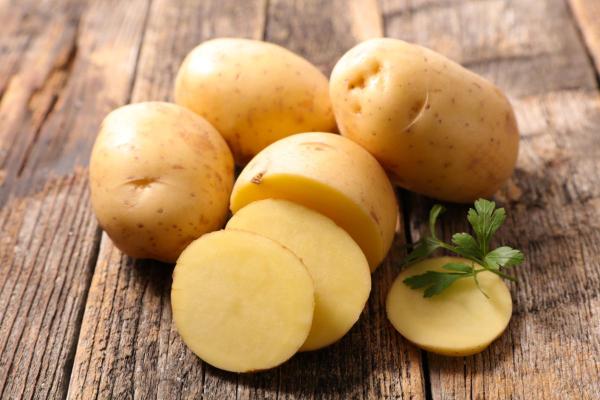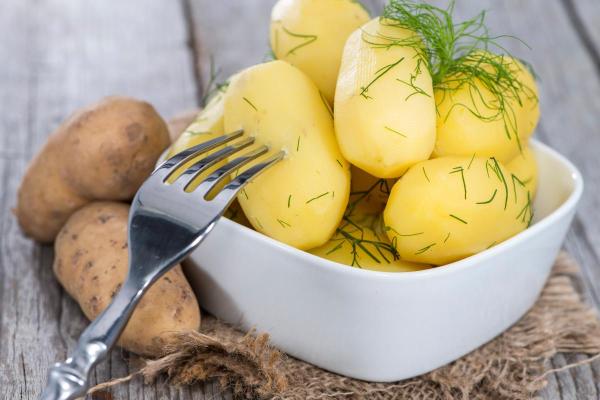Are Potatoes Bad for High Cholesterol?


Many people wonder if potatoes are bad for cholesterol or good for regulating it. While deep-fried fries and butter-laden mashed potatoes might not be the healthiest choices, potatoes themselves can be a heart-friendly addition to your diet. Potatoes can be beneficial for digestive health and do not increase cholesterol levels. In fact, they can help control cholesterol when prepared healthily.
In this oneHOWTO article, we will delve into whether potatoes are bad for cholesterol or good for regulating it, and explore the many benefits of their consumption. We'll also provide tips on choosing healthy cooking techniques, delicious topping ideas, and mindful portion control to ensure your spud enjoyment doesn't come at the cost of your cardiovascular well-being.
Are potatoes bad for high cholesterol?
Potatoes have gotten a bad rap when it comes to heart health. The misconception is that they inherently raise cholesterol levels. But the truth is more nuanced. Plain, uncooked potatoes themselves contain minimal cholesterol and are a good source of complex carbohydrates, the fuel your body prefers for energy.
Let us begin by understanding cholesterol. Cholesterol is a waxy substance naturally produced by your liver and found in your blood. It plays a vital role in building healthy cells and producing certain hormones.
When LDL cholesterol builds up in your arteries (plaque formation), it reduces blood flow. This can lead to several health complications, including coronary heart disease, strokes, and peripheral artery disease (PAD), among others.
There are two main types of cholesterol:
- LDL (Low-Density Lipoprotein): often referred to as "bad" cholesterol. LDL cholesterol travels through your bloodstream and can build up on the walls of your arteries. These fatty buildups, called plaques, can narrow the arteries, reducing blood flow to your heart and other organs.
- HDL (High-Density Lipoprotein): considered "good" cholesterol. HDL helps remove LDL cholesterol from your arteries and transport it back to your liver for disposal.
So, what's behind the confusion? The key lies in preparation methods. Deep-frying potatoes or loading them with butter and unhealthy toppings significantly increases their fat content. These added fats, particularly saturated and trans fats, are the primary culprits for raising LDL ("bad") cholesterol levels.
Potatoes are rich in potassium, a mineral that helps regulate blood pressure. High blood pressure is another risk factor for heart disease, so keeping it in check is important.
Finally, potatoes provide essential vitamins and minerals like vitamin B6 for energy metabolism and vitamin C for immune function.

Effects of potatoes on cholesterol
As mentioned before, potatoes have minimal fat and are a good source of complex carbohydrates and fiber, which can contribute to a healthy diet. They provide beneficial nutrients like carotenoids and polyphenols, which act as antioxidants and have anti-inflammatory properties, supporting cardiovascular health.
They are a good source of dietary fiber, particularly soluble fiber. This type of fiber can bind to cholesterol in your digestive system and help eliminate it from the body, potentially lowering LDL ("bad") cholesterol levels. Including potatoes as part of a balanced diet rich in various fiber sources can help manage cholesterol levels.
Potatoes also offer other health benefits, supporting brain, cardiovascular, circulatory, and digestive health due to their nutritional profile. People with high cholesterol can include potatoes in their diet if they are prepared healthily, such as boiled or baked without excessive butter or oil.
It is important to note that potatoes alone are not sufficient to regulate LDL cholesterol levels; they should be part of a broader, balanced diet for optimal health.

How do you eat potatoes with high cholesterol
To regulate cholesterol, it is essential to consume potatoes appropriately, avoiding fried varieties commonly found in junk food.
Potatoes themselves do not increase cholesterol levels. The real issue lies in saturated and trans fats, which can raise bad cholesterol. Consuming potatoes baked, steamed, or boiled allows you to enjoy their benefits while maintaining healthy cholesterol levels. Eating potatoes with their skin provides additional nutrients and fiber.
A balanced diet that includes high-fiber foods like oats, oat bran, brussels sprouts, beans, pears, and apples is also crucial for reducing bad cholesterol. These foods contain soluble fiber, which helps lower LDL cholesterol in the bloodstream.
Incorporating fish into your diet can further benefit your health. Fish provide omega-3 fatty acids, which reduce triglycerides, prevent clot formation, and lower blood pressure. Herring, mackerel, tuna, trout, and salmon are especially high in omega-3s. Alongside potatoes and fish, other healthy foods include flaxseed, walnuts, canola oil, almonds, avocados, and olive oil.
Opt for healthier cooking methods like:
- Baking: this creates a crispy skin with minimal added fat. You can even use a touch of olive oil for extra flavor.
- Boiling: this is a simple and effective way to cook potatoes while preserving nutrients.
- Steaming: this method results in a lighter texture and retains most of the vitamins and minerals.
- Microwaving: while not the most traditional method, microwaving can cook potatoes quickly with minimal added water or fat. Just be sure to pierce the skin first to prevent them from exploding.
It is also important to skip the butter and sour cream, because, as mentioned earlier, these traditional toppings are high in saturated fat. Explore healthier alternatives like:
- Low-fat greek yogurt: provides a creamy texture with less fat and a protein boost.
- Salsa: adds flavor and antioxidants without extra fat.
- Fresh herbs and spices: infuse your potatoes with flavor without adding calories or unhealthy fats. Experiment with options like rosemary, thyme, garlic powder, or chili flakes.
- Healthy fats: a drizzle of olive oil or avocado oil adds a touch of healthy fat and improves flavor.
While potatoes themselves are not inherently bad for cholesterol, moderation is key. Aim for a reasonable serving size, typically around the size of your fist.
This article tackled healthy potato choices, but did you know you can steam them without a steamer? Our recommended article unlocks creative and easy ways to cook perfect potatoes, any time.
This article is merely informative, oneHOWTO does not have the authority to prescribe any medical treatments or create a diagnosis. We invite you to visit your doctor if you have any type of condition or pain.
If you want to read similar articles to Are Potatoes Bad for High Cholesterol?, we recommend you visit our Family health category.






